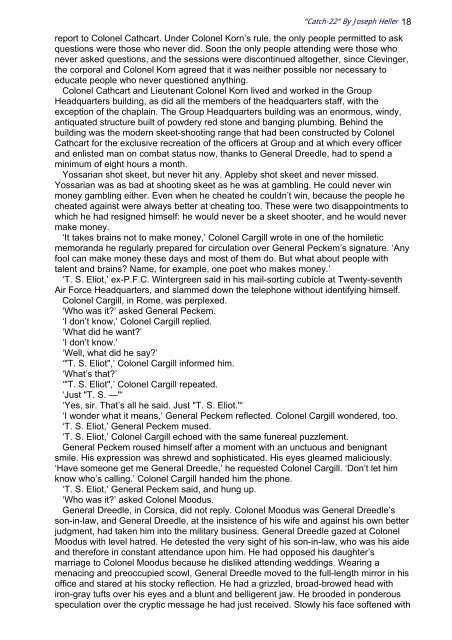You also want an ePaper? Increase the reach of your titles
YUMPU automatically turns print PDFs into web optimized ePapers that Google loves.
“Catch-22” <strong>By</strong> <strong>Joseph</strong> Heller 18<br />
report to Colonel Cathcart. Under Colonel Korn’s rule, the only people permitted to ask<br />
questions were those who never did. Soon the only people attending were those who<br />
never asked questions, and the sessions were discontinued altogether, since Clevinger,<br />
the corporal and Colonel Korn agreed that it was neither possible nor necessary to<br />
educate people who never questioned anything.<br />
Colonel Cathcart and Lieutenant Colonel Korn lived and worked in the Group<br />
Headquarters building, as did all the members of the headquarters staff, with the<br />
exception of the chaplain. The Group Headquarters building was an enormous, windy,<br />
antiquated structure built of powdery red stone and banging plumbing. Behind the<br />
building was the modern skeet-shooting range that had been constructed by Colonel<br />
Cathcart for the exclusive recreation of the officers at Group and at which every officer<br />
and enlisted man on combat status now, thanks to General Dreedle, had to spend a<br />
minimum of eight hours a month.<br />
Yossarian shot skeet, but never hit any. Appleby shot skeet and never missed.<br />
Yossarian was as bad at shooting skeet as he was at gambling. He could never win<br />
money gambling either. Even when he cheated he couldn’t win, because the people he<br />
cheated against were always better at cheating too. These were two disappointments to<br />
which he had resigned himself: he would never be a skeet shooter, and he would never<br />
make money.<br />
‘It takes brains not to make money,’ Colonel Cargill wrote in one of the homiletic<br />
memoranda he regularly prepared for circulation over General Peckem’s signature. ‘Any<br />
fool can make money these days and most of them do. But what about people with<br />
talent and brains? Name, for example, one poet who makes money.’<br />
‘T. S. Eliot,’ ex-P.F.C. Wintergreen said in his mail-sorting cubicle at Twenty-seventh<br />
Air Force Headquarters, and slammed down the telephone without identifying himself.<br />
Colonel Cargill, in Rome, was perplexed.<br />
‘Who was it?’ asked General Peckem.<br />
‘I don’t know,’ Colonel Cargill replied.<br />
‘What did he want?’<br />
‘I don’t know.’<br />
‘Well, what did he say?’<br />
‘"T. S. Eliot",’ Colonel Cargill informed him.<br />
‘What’s that?’<br />
‘"T. S. Eliot",’ Colonel Cargill repeated.<br />
‘Just "T. S. —"‘<br />
‘Yes, sir. That’s all he said. Just "T. S. Eliot."‘<br />
‘I wonder what it means,’ General Peckem reflected. Colonel Cargill wondered, too.<br />
‘T. S. Eliot,’ General Peckem mused.<br />
‘T. S. Eliot,’ Colonel Cargill echoed with the same funereal puzzlement.<br />
General Peckem roused himself after a moment with an unctuous and benignant<br />
smile. His expression was shrewd and sophisticated. His eyes gleamed maliciously.<br />
‘Have someone get me General Dreedle,’ he requested Colonel Cargill. ‘Don’t let him<br />
know who’s calling.’ Colonel Cargill handed him the phone.<br />
‘T. S. Eliot,’ General Peckem said, and hung up.<br />
‘Who was it?’ asked Colonel Moodus.<br />
General Dreedle, in Corsica, did not reply. Colonel Moodus was General Dreedle’s<br />
son-in-law, and General Dreedle, at the insistence of his wife and against his own better<br />
judgment, had taken him into the military business. General Dreedle gazed at Colonel<br />
Moodus with level hatred. He detested the very sight of his son-in-law, who was his aide<br />
and therefore in constant attendance upon him. He had opposed his daughter’s<br />
marriage to Colonel Moodus because he disliked attending weddings. Wearing a<br />
menacing and preoccupied scowl, General Dreedle moved to the full-length mirror in his<br />
office and stared at his stocky reflection. He had a grizzled, broad-browed head with<br />
iron-gray tufts over his eyes and a blunt and belligerent jaw. He brooded in ponderous<br />
speculation over the cryptic message he had just received. Slowly his face softened with
















